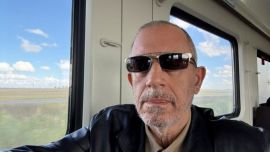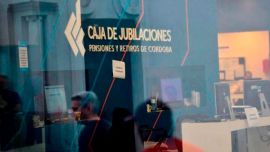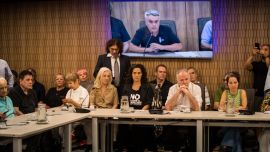MACRI’S SPEECH, TURBULENCE AND IMF TALKS
President Mauricio Macri started this week early with a speech on Monday morning to explain new fiscal measures to bring forward “zero deficit” to next year and fresh approaches to the International Monetary Fund (IMF) with Economy (Treasury until that day) Minister Nicolás Dujovne already in Washington to start negotiations. In its austerity package, the government announced it would reintroduce export duties, halve the number of ministries (turning many into secretariats) and work with a smaller cabinet. In his 25-minute speech (unusually long by his standards) Macri described the current situation as an “emergency” to justify the measures (calling it “the five worst weeks of my life since my kidnapping”). The speech was seen as addressed to the Argentine public more than the markets since Macri proposed to “put the truth on the table” about an adverse economic situation, rather than seek to recapture confidence with some bullish talk. He also gained the support of United States President Donald Trump, who said the next day from the White House: “I have confidence in President Macri’s leadership, and I strongly encourage and support his engagement with the International Monetary Fund to strengthen Argentina’s monetary and fiscal policies to tackle the country’s current economic challenges.” Meanwhile, federal prosecutor Jorge Di Lello – a member of the Justicia Legitíma Kirchnerite legal grouping – has taken June’s standby agreement with the IMF to court, arguing that it was never submitted to Congress. Federal Judge Julián Ercolini will now decide if he will take up the case.
SLIDING STATISTICS
Inflation of 42 percent and negative growth of -2.4 percent – these are the official 2018 forecasts of the Economy Ministry, at least according to a slide involuntarily shown in the background while Minister Nicolás Dujovne was announcing the latest fiscal adjustments on Monday. The minister hastily explained that the slide contained unpublished and provisional calculations and the inflation forecast was subsequently trimmed downwards to 40 percent – no precise growth figure was given but Dujovne said on Monday: “We’ll review the figures in the next few days assuming that this year’s recession will be more pronounced than we had thought.” Not a basis for avoiding worse poverty and unemployment figures.
PROVOLO ABUSE PROBE
For the second time in two years a Próvolo Institute has fallen into disgrace over the alleged abuse of children – on Thursday the Buenos Aires provincial police raided a La Plata branch to investigate accusations of priestly abuse against 17 deaf and dumb children in the last two decades of the past century. In 2016 the institute’s Mendoza chapter was investigated on similar accusations.
THIS WEEK IN CORRUPTION...
Even if the Kirchnerite corruption scandal has faded into the background amid economic turbulence, there was plenty of courtroom action on that front last week, much of it concerning expresident Senator Cristina Fernández de Kirchner. On Monday she testified in writing to Federal Judge Claudio Bonadio concerning public works graft under her presidency. On the same day a February 26 date was set for her trial by Federal Judge Julián Ercolini on similar charges specifically concerning public works in Santa Cruz – former Federal Planning minister Julio De Vido, his Public Works secretary José López and tycoon Lázaro Báez are among her co-defendants. On Tuesday, Federal Judge Sebastián Casanello summoned the senator for September 18 to testify on money-laundering via Báez. And on Thursday Bonadio finally accepted Kirchner financier Ernesto Clarens as the latest whistleblower.
RIP FABIÁN TOMASI
Former farmworker Fabián Tomasi died Friday morning in the Entre Ríos town of Basavilbaso, after being hospitalised once again. Tomasi, who worked fields using products containing glyphosate, saw his health detoriate after prolonged exposure to the controversial agrochemical. Thanks to photos taken by Pablo Piovano, he became a symbolic figure for environmental campaigners across the world who are pushing for a ban on the use of glyphosate in farming.
UNIVERSITY STAFF ACCEPT SALARY OFFER
At press time, it was announced that unions representing university staff had decided to accept a salary offer of between 24 and 26 percent, ending the conflict that had paralyzed institutions.
SHIP ENTERS MALVINAS ZONE
The Argentine Navy vessel ARA Puerto Deseado strayed into the British exclusion zone around the Malvinas on August 31, it was revealed Thursday, coming to within 40 kilometres of the islands and causing alarm there over the proximity of an Argentine warship. HMS Clyde sailed out to intercept her although according to British government sources, the intention was to offer assistance in stormy conditions. At 7.17pm that evening the Argentine ship switched its satellite identification back on and changed its course to Ushuaia, from where it had sailed on August 20 on a scientific mission. Argentine naval sources blamed the deviation on the storm.
A DEATH IN CHACO
Ismael Ramírez, 13, was fatally shot in the chest on Monday in the Chaco town of Sáenz Peña while provincial police were repelling a group trying to loot a supermarket. Another child was shot in the eye. Security Minister Patricia Bullrich reacted controversially, saying that such episodes are “planned via WhatsApp” by “Kirchnerite groups.” Claiming that these looting incidents always had some Kirchnerite behind them, Bullrich expressed hopes that they remained isolated, though her remarks centred on identifying who organised the looting, not on who killed the boy. Meanwhile the local prosecutor in the case said that the deadly bullet did not correspond to a regulation police firearm, thus opening up speculation that the boy might have been slain by vigilantes who have been known to be arming themselves against social unrest. The clash resulted in 19 arrests and eight or nine policemen injured.

























Comments